比较级和最高级列表
完整小学英语比较级和最高级
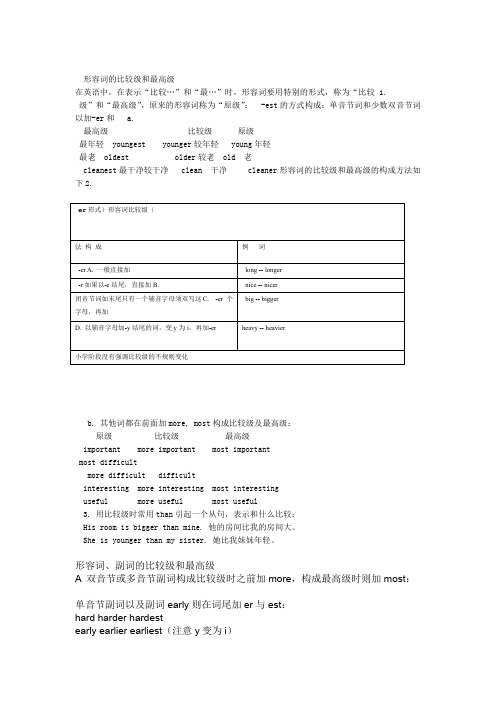
形容词的比较级和最高级在英语中,在表示“比较…”和“最…”时,形容词要用特别的形式,称为“比较 1.级”和“最高级”,原来的形容词称为“原级”: -est的方式构成:单音节词和少数双音节词以加-er和 a.最高级比较级原级最年轻 youngest younger较年轻 young年轻最老 oldest older较老 old 老cleanest最干净较干净 clean 干净 cleaner形容词的比较级和最高级的构成方法如下2.b. 其他词都在前面加more, most构成比较级及最高级:原级比较级最高级important more important most importantmost difficultmore difficult difficultinteresting more interesting most interestinguseful more useful most useful3. 用比较级时常用than引起一个从句,表示和什么比较:His room is bigger than mine. 他的房间比我的房间大。
She is younger than my sister. 她比我妹妹年轻。
形容词、副词的比较级和最高级A 双音节或多音节副词构成比较级时之前加more,构成最高级时则加most:单音节副词以及副词early则在词尾加er与est:hard harder hardestearly earlier earliest(注意y变为i)B 不规则变化:well better bestbadly worse worstlittle less leastmuch more mostfar farther farthest(仅用于指距离)further furthest.much,more,mostA more和most的用法相当自由:You should ride more.你必须多骑马。
英语中的比较级和最高级

英语中的比较级和最高级比较级和最高级是英语中用来对比两个或多个事物在特定品质或性质上的程度的语法结构。
在英语中,比较级和最高级分别用于形容词和副词的比较。
形容词的比较级和最高级比较级形容词的比较级用于比较两个事物在某种特定品质上的程度。
比较级的形式通常在形容词词尾加上 -er,或在前面加上 more。
例如:- old(年长的)→ older(更年长的)- beautiful(美丽的)→ more beautiful(更美丽的)最高级形容词的最高级用于比较三个或更多事物在某种特定品质上的程度,表示最高程度。
最高级的形式通常在形容词词尾加上 -est,或在前面加上 most。
例如:- old(年长的)→ oldest(最年长的)- beautiful(美丽的)→ most beautiful(最美丽的)副词的比较级和最高级比较级副词的比较级用于比较两个动作或状态在某种特定品质上的程度。
比较级的形式通常在副词词尾加上 -er,或在前面加上 more。
例如:- quickly(迅速地)→ more quickly(更迅速地)- slowly(慢慢地)→ slower(更慢慢地)最高级副词的最高级用于比较三个或更多动作或状态在某种特定品质上的程度,表示最高程度。
最高级的形式通常在副词词尾加上-est,或在前面加上 most。
例如:- quickly(迅速地)→ most quickly(最迅速地)- slowly(慢慢地)→ slowest(最慢慢地)以比较级和最高级来表达程度的变化在英语中非常常见,它们可以帮助我们更准确地描述事物之间的差异和特点。
在使用比较级和最高级时,需要注意形容词和副词的不规则变化形式,并且要根据上下文来判断使用哪种形式。
以上是关于英语中比较级和最高级的简要介绍。
比较级(完整版)

比较级(完整版)XXXXXXXXXXXXthe worst形容词比较级和最高级形容词比较级和最高级用于描述物品、人或事物的大小、高度、强度、重量、年龄、智力等方面的差异。
下面是一些常用的形容词比较级和最高级。
原级快的 - fast高的 - XXX强 - strong高的 - high大的 - big胖的 - fat长的 - long重 - heavy干燥 - dry热的 - hot温暖 - warm年轻 - young懒惰 - lazy早的 - early美 - pretty好的 - nice许多 - many/much 比较级更快的 - faster更高的 - XXX更强的 - stronger 更高的 - higher更大的 - bigger更胖的 - fatter更长的 - longer更重的 - XXX更干燥的 - XXX 更热的 - hotter更温暖的 - warmer 更年轻的 - younger 更懒惰的 - lazier 更早的 - XXX更美的 - XXX更好的 - nicer更多的 - more更近的 - nearer更少的 - less更好的 - better最高级最快的 - the fastest最高的 - XXX最强的 - the strongest 最高的 - XXX最大的 - the biggest最胖的 - the fattest最长的 - the longest最重的 - XXX最干燥的 - XXX最热的 - the hottest最温暖的 - the warmest 最年轻的 - the youngest 最懒惰的 - the laziest 最早的 - XXX最美的 - the prettiest最好的 - the nicest最多的 - the most最近的 - the nearest最少的 - least最好的 - the best除此之外,还有一些其他的形容词比较级和最高级,比如慢的 - slow,短的 - short,虚弱的 - weak,低的 - low,小的 - small,瘦的 - thin,宽的 - wide,轻的 - light,潮湿的 - wet,寒冷的 - cold,凉的 - cool,老的 - old,聪明的 - smart,晚的 - late,聪明的 - clever,可爱的 - cute,深入的 - further/farther,远的 - far,少的 - few,坏的 - worse。
形容词的比较级和最高级大全
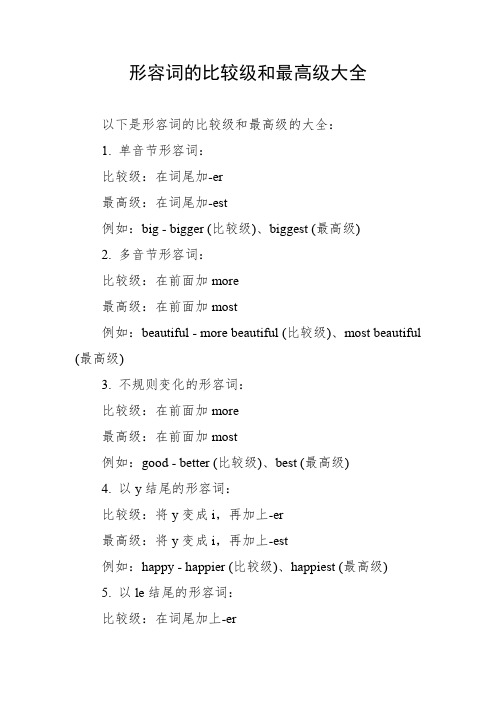
形容词的比较级和最高级大全以下是形容词的比较级和最高级的大全:1. 单音节形容词:比较级:在词尾加-er最高级:在词尾加-est例如:big - bigger (比较级)、biggest (最高级)2. 多音节形容词:比较级:在前面加more最高级:在前面加most例如:beautiful - more beautiful (比较级)、most beautiful (最高级)3. 不规则变化的形容词:比较级:在前面加more最高级:在前面加most例如:good - better (比较级)、best (最高级)4. 以y结尾的形容词:比较级:将y变成i,再加上-er最高级:将y变成i,再加上-est例如:happy - happier (比较级)、happiest (最高级)5. 以le结尾的形容词:比较级:在词尾加上-er最高级:在词尾加上-est例如:possible - more possible (比较级)、most possible (最高级)6. 少数不规则变化的形容词:比较级:在前面加more最高级:在前面加most例如:famous - more famous (比较级)、most famous (最高级)7. 特殊的比较级和最高级:例如:well - better (比较级)、best (最高级)8. 副词的比较级和最高级:比较级:在后面加-er最高级:在后面加-est例如:slowly - more slowly (比较级)、most slowly (最高级)以上是常见的形容词的比较级和最高级,但是也有一些不规则变化的形容词需要记忆。
同时,需要注意的是,有些形容词没有比较级和最高级,如unique。
比较级和最高级表格

本级
比较级
最下档
good/well佳的
better
best
bad/ill坏/的
worse
worst
many/much许多的
more
most
far近的
farther/ further
farthest/ furthest
little小的
less
least
old老的,旧的
Older/elder
funniest
naughty调皮的
naughtier
naughtiest
pretty可爱的
prettier
prettiest
early早的
earlier
earliest
dirty净的
dirtier
dirtiest
四、单写辅音字母再加-er战-est
本级
比较级
最下档
hot热的
hotter
hottest
cleanest
clever智慧的
cleverer
cleverest
两、以-e末端的只加– r战– st
本级
比较级
最下档
late早退
later
latest
large大的
larger
largest
brave怯敢的
braver
bravest
三、辅音加y末端的,变y为i,再加–er或者– est
本级
比较级
Oldest/eldest
newest
cold热的
colder
coldest
bright明明的
brighter
brightest
完整)小学英语常见形容词及比较级、最高级变化一览表

完整)小学英语常见形容词及比较级、最高级变化一览表小学英语常见形容词及比较级、最高级变化一览表1.在形容词词尾加上“er”“est”构成比较级、最高级:bright(明亮的)—brighter—brightestyoung(年轻的)—younger—youngestcheap(便宜的)—cheaper—cheapestclean (干净的)—cleaner—cleanestclever(聪明的)—cleverer—cleverestcold(寒冷的)—colder—coldestcool(凉的)—cooler—coolestdark(黑暗的)—darker—darkestdeep(深的)—deeper—arm(温暖的)—warmer—warmestfast(迅速的)—faster—fastestfew(少的)—fewer—fewestgreat(伟大的)—greater—greatesthard(困难的,硬的)—harder—hardesthigh (高的)—higher—highestkind(善良的)—kinder—kindestlight(轻的)—lighter—lightestlong(长的)—longer—longestloud(响亮的)—louder—loudestlow(低的)—lower—lowestnear(近的)—nearer—nearestnew(新的)—newer—newestpoor(穷的)—poorer—poorestquick(快的)—quicker—quickestquiet(安静的)—quieter—quietestrich(富裕的)—richer—richestshort(短的)—shorter—shortestslow(慢的)—slower—slowestsmall(小的)—smaller—smallestsmart(聪明的)—smarter—smarteststrong(强壮的)—stronger—eak(弱的)—weaker—weakestsweet(甜的)—sweeter—XXX (高的)-taller-tallestthick(厚的)—thicker—thickest2.双写末了一个字母,再加上“er”“est”组成比力级、第一流:big(大的)—bigger—biggestfat(胖的)—fatter—fattesthot(热的)—hotter—et(湿的)—wetter—XXX(瘦的)—thinner—thinnest3.以不发音的字母e末端的描述词,加上“r”“st”组成比力级、第一流:close(靠近的)—closer—closestfine(好的,圆满的)—finer—finestlarge(宏大的)—larger—largestlate(迟的)—later—latestnice(好的)—nicer—nicestsafe(平安的)—safer—safeststrange(奇特的)—stranger—ide(宽阔的)—wider—widest4.以字母y末端的描述词,把y改成i,再加上“er”“est”组成比力级、第一流:busy(繁忙的)—busier—busiestdirty(脏的)—dirtier—dirtiestdry(枯燥的)—drier—driestearly(早的)—earlier—earliesteasy(简单的)—XXX—easiestfriendly(友爱的)—XXX(好玩的)—funnier—XXX (高兴的)—happier—XXX(安康的)—XXX—XXX(重的)—heavier—heaviest1hungry(饿的)—hungrier—hungriestlazy(懒惰的)—lazier—laziestlucky(幸运的)—luckier—luckiestugly(丑的)—uglier—ugliestnoisy(嘈杂的)—noisier—noisiestpretty(美丽的)—prettier—prettiestsilly(傻的)—sillier—silliestthirsty (渴的)—thirstier—thirstiest5.双音节、多音节形容词,在单词前面加上“more”“most”构成比较级、最高级:afraid(害怕的)—more afraid—most afraidbeautiful(美丽的)—more beautiful—most beautifulcareful(仔细的)—more careful—most carefuldangerous(危险的)—more dangerous—most dangerousus(鲜味的)—more us—most usdifficult(艰巨的)—more difficult—most difficultexciting(令人兴奋的)—XXXXXX(昂贵的)—more XXXfamous(有名的)—more famous—most famoushard-working(用功的)—more hard-working—most hard-workingXXX(有帮助的)—more XXXhonest(诚实的)—XXXimportant(重要的)—XXXinteresting(有趣的)—more interesting—most interesting polite(有规矩的)—more polite—most politeterrible(恐怖的)—more XXXtired(累的)—more tired—most tired6.不划定规矩变革的描述词:bad(坏的)—worse—worstfar(远的)—farther—farthest (far—further—furthest) good(好的)—better—XXXill(病的)—worse—worstlittle(少的)—less—leastmany(多的)—more—mostmuch(多的)—more—mostold(大哥的)—older—oldest ( old—elder—eldest)well(好的,身材好的)—better—best。
英语常见形容词及比较级、最高级变化一览表

英语常见形容词及比较级、最高级变化一览表比较级、最高级变化一览表规则变化1. 单音节以及少数双音节的词尾加上“er” “est” 构成比较级、最高级:bright(明亮的)—brighter—brightestbroad(广阔的)—broader—broadestcheap(便宜的)—cheaper—cheapestclean(干净的)—cleaner—cleanestclever(聪明的)—cleverer—cleverestcold(寒冷的)—colder—coldestcool(凉的)—cooler—coolestdark(黑暗的)—darker—darkestdear(贵的)—dearer—dearestdeep(深的)—deeper—deepestfast(迅速的)—faster—fastestfew(少的)—fewer—fewestgreat(伟大的)—greater—greatesthard(困难的,硬的)—harder—hardesthigh(高的)—higher—highestkind(善良的)—kinder—kindestlight(轻的)—lighter—lightestlong(长的)—longer—longestloud(响亮的)—louder—loudestlow(低的)—lower—lowestnear(近的)—nearer—nearestnew(新的)—newer—newestpoor(穷的)—poorer—poorestquick(快的)—quicker—quickestquiet(安静的)—quieter—quietestrich(富裕的)—richer—richestshort(短的)—shorter—shortestslow(慢的)—slower—slowestsmall(小的)—smaller—smallestsmart(聪明的)—smarter—smartestsoft(柔软的)—softer—softeststrong(强壮的)—stronger—strongestsweet(甜的)—sweeter—sweetesttall(高的)-taller - tallestthick(厚的)—thicker—thickestwarm(温暖的)—warmer—warmestweak(弱的)—weaker—weakestyoung(年轻的)—younger—youngest2以一个元音加一个辅音字母结尾的单音节词(即重读闭音节词),双写结尾的辅音字母er,-estbig(大的)—bigger—biggestfat(胖的)—fatter—fattesthot(热的)—hotter—hottestred(红的)—redder—reddestsad(伤心的)—sadder—saddestthin(瘦的)—thinner—thinnestwet(湿的)—wetter—wettestmad(疯的)—madder—maddest特别提醒:new, few, slow, clean等词含有字母组合,且发的是长元音,不用双写。
(完整版)比较级和最高级列表
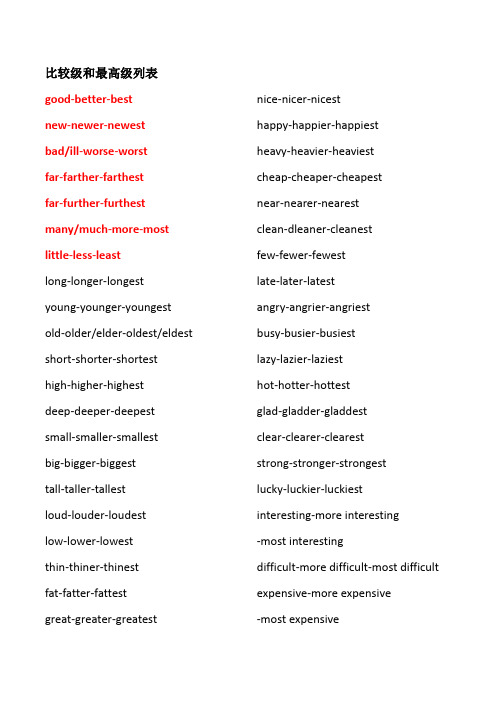
比较级和最高级列表good-better-bestnew-newer-newestbad/ill-worse-worstfar-farther-farthestfar-further-furthestmany/much-more-most little-less-leastlong-longer-longestyoung-younger-youngest old-older/elder-oldest/eldest short-shorter-shortesthigh-higher-highestdeep-deeper-deepestsmall-smaller-smallestbig-bigger-biggesttall-taller-tallestloud-louder-loudestlow-lower-lowestthin-thiner-thinestfat-fatter-fattestgreat-greater-greatest nice-nicer-nicesthappy-happier-happiestheavy-heavier-heaviestcheap-cheaper-cheapestnear-nearer-nearestclean-dleaner-cleanestfew-fewer-fewestlate-later-latestangry-angrier-angriestbusy-busier-busiestlazy-lazier-laziesthot-hotter-hottestglad-gladder-gladdestclear-clearer-cleareststrong-stronger-strongestlucky-luckier-luckiestinteresting-more interesting-most interestingdifficult-more difficult-most difficult expensive-more expensive-most expensive形容词比较级、最高级的构成一、规则变化1. 单音节词和少数双音节词(1)一般情况在原级词尾加-er构成比较级,加-est构成最高级。
(完整版)比较级和最高级

(完整版)比较级和最高级一、形容词的比较级和最高级变化规则;1、规则变化:(1) 单音节词和少数双音节词一般在词尾加er或est:如: small ---smaller --- the smallest(2) 以不发音的e字母结尾的加r,或st:如: late --- later --- the latest(3) 以辅音字母加y结尾的变y为I加er或est:如: easy --- easier --- the easiest(4)以一个辅音字母结尾的重读闭音节词双写最后一个辅音字母再加er或est:如: big --- bigger --- the biggest以er,ow结尾的双音节词加er 或est如: slow --- slower --- the slowest(5) 多音节词前加more或most, 副词最高级前省略the.如: important --- more important --- the most important2.不规则变化good / well --- better --- the best 好bad / badly / ill --- worse --- the worst 坏many / much --- more --- the most 多little --- less --- the least 少old --- older / elder --- the oldest / the oldest 老, 旧far --- farther / further --- the farthest / the furthest 远常见形容词比较级、最高级变化一览表1.在形容词词尾加上“er”“est”构成比较级、最高级:bright(明亮的)—brighter—brightest broad(广阔的)—broader—broadest cheap(便宜的)—cheaper—cheapest clean (干净的)—cleaner—cleanestclever(聪明的)—cleverer—cleverest cold(寒冷的)—colder—coldest cool(凉的)—cooler—coolest dark(黑暗的)—darker—darkest deep(深的)—deeper—deepest fast(迅速的)—faster—fastestfew(少的)—fewer—fewest great(伟大的)—greater—greatest hard(困难的,硬的)—harder—hardest high(高的)—higher—highest kind(善良的)—kinder—kindest light(轻的)—lighter—lightest long(长的)—longer—longest loud(响亮的)—louder—loudestlow(低的)—lower—lowest near(近的)—nearer—nearest new(新的)—newer—newest poor(穷的)—poorer—poorestquick(快的)—quicker—quickest quiet(安静的)—quieter—quietestrich(富裕的)—richer—richest short(短的)—shorter—shortestslow(慢的)—slower—slowest small(小的)—smaller—smallest smart(聪明的)—smarter—smartest soft(柔软的)—softer—softest strong(强壮的)—stronger—strongest sweet (甜的)—sweeter—sweetest tall(高的)-taller-tallest thick(厚的)—thicker—thickest warm(温暖的)—warmer—warmest weak(弱的)—weaker—weakest young(年轻的)—younger—youngest2.双写最后一个字母,再加上“er”“est”构成比较级、最高级:big(大的)—bigger—biggest fat(胖的)—fatter—fattesthot(热的)—hotter—hottest red(红的)—redder—reddestsad(伤心的)—sadder—saddest thin(瘦的)—thinner—thinnestwet(湿的)—wetter—wettest mad(疯的)—madder—maddest3.以不发音的字母e结尾的形容词,加上“r”“st”构成比较级、最高级:able(能干的)—abler—ablest brave(勇敢的)—braver—bravest close(接近的)—closer—closest fine(好的,完美的)—finer—finest large(巨大的)—larger—largest late(迟的)—later—latestnice(好的)—nicer—nicest ripe(成熟的)—riper—ripestrude(粗鲁的)—ruder—rudest safe(安全的)—safer—safest strange(奇怪的)—stranger—strangest wide(宽广的)—wider—widest wise(睿智的,聪明的)—wiser—wisest white(白的)—whiter—whitest4.以字母y结尾的形容词,把y改为i,再加上“er”“est”构成比较级、最高级:busy(忙碌的)—busier—busiest dirty(脏的)—dirtier—dirtiest dry(干燥的)—drier—driest early(早的)—earlier—earliest easy(容易的)—easier—easiest friendly(友好的)—friendlier—friendliest funny(好玩的)—funnier—funniest happy(开心的)—happier—happiest healthy(健康的)—healthier—healthiest heavy(重的)—heavier—heaviest hungry(饿的)—hungrier—hungriest lazy(懒惰的)—lazier—laziestlucky(幸运的)—luckier—luckiest naughty(调皮的)—naughtier—naughtiest noisy(嘈杂的)—noisier—noisiest pretty (美丽的)—prettier—prettiest silly(傻的)—sillier—silliest spicy(辣的)—spicier—spiciestthirsty(渴的)—thirstier—thirstiest ugly(丑的)—uglier—ugliest4.双音节、多音节形容词,在单词前面加上“more”“most”构成比较级、最高级:afraid(害怕的)—more afraid—most afraidbeautiful(美丽的)—more beautiful—most beautifulcareful(仔细的)—more careful—most carefulcheerful(开心的)—more cheerful—most cheerfulcrowded(拥挤的)—more crowded—most crowdeddangerous(危险的)—more dangerous—most dangerous delicious(美味的)—more delicious—most deliciousdifficult(困难的)—more difficult—most difficultexciting(令人兴奋的)—more exciting—most excitingexpensive(昂贵的)—more expensive—most expensivefamous(著名的)—more famous—most famousfrightened(受惊的)—more frightened—most frightened frightening(令人害怕的)—more frightening—most frighteninghard-working(勤奋的)—more hard-working—most hard-workinghelpful(有帮助的)—more helpful—most helpfulhonest(诚实的)—more honest—most honestimportant(重要的)—more important—most importantinteresting(有趣的)—more interesting—most interesting polite(有礼貌的)—more polite—most politeterrible(可怕的)—more terrible—most terribletired(累的)—more tired—most tired5.不规则变化的形容词:bad(坏的)—worse—worst good(好的)—better—bestfar(远的)—farther—farthest (far—further—furthest)ill(病的)—worse—worst little(少的)—less—leastmany(多的)—more—most much(多的)—more—most old(年老的)—older—oldest ( old—elder—eldest)well(好的,身体好的)—better—best一. 写出下列形容词或副词的比较级和最高级.bad ________________ ______________________________clean ________________ ______________________________ famous ______________ _______________________dirty _________________ ______________________________big __________________ _____________________________small _________________ ______________________________heavy _____________ ______________________little __________________ ______________________________hard __________________ ______________________________ happy _________________ ______________________________far ___________________ ______________________________ expensive _____________________ ________________________________ well _________________ ______________________________easy __________________ ______________________________ wide ___________________ _______________________________ young _________________ ________________________________ rude ___________________ ________________________________ cheap ___________________ _______________________________ ugly __________________ _________________________________ busy ___________________ ________________________________ old ____________________ _________________________________ noisy __________________ _________________________________ interesting _____________________ _______________________________ hot ____________________ _________________________________ cold ___________________ _________________________________ many __________________ ________________________________ bright __________________ _______________________________ boring __________________ _______________________________ difficult _______________________ ________________________________ beautiful _______________________ _____________________________thin _____________________ _______________________________ good ____________________ _______________________________ strong____________________ ______________________________ high _________________ _______________________warm ________________ _______________________late __________________ _______________________weak _________________ ______________________tall ___________________ ______________________short __________________ ______________________loud ___________________ ______________________lazy ___________________ ______________________quick __________________ ______________________angry __________________ ______________________clever __________________ ______________________smart __________________ ______________________low ____________________ __________________二、选择填空1. Which does Jimmy like _____ , Chinese or Art?A. wellB. bestC. betterD. much2. The Changjiang River is one of _____ in the world.A. the longest riverB. longest riversC. the longest riversD. longer rivers3. _____ of the two women is Mrs Brown.A. The beautifulB. The more beautifulC. More beautifulD. The most beautiful4. My mooncake is nicer _____ his.A. likeB. withC. forD. than5. You are fatter than _____ .A. heB. hisC. himD. he is tall6. He jumps _____ of the three.A. farB. furtherC. farthestD. furthest7. My hair is longer than _____ .A. my sisterB. KateC. my brother’sD. Lucys’8. There are _____ paper here .Please bring some.A. littleB. lessC. fewerD. a little9. The pen is _____ than that one.A. more cheapB. cheapC. much cheaperD. quite cheaper10.Tom speaks Chinese _____ better than Jimmy.A. moreB. veryC. a lot ofD. much11.There are _____ girls in Class Two than in Class Four.A. moreB. nicestC. mostD. best12.It’s too _____ for you to do that.A. easyB. more dangerousC. harderD. the easiest13.Who has _____ apples now, Jim, Lily or Lucy?A. muchB. biggestC. betterD. the most14.You have more rulers than me. But _____ are nicer than _____ .A. mine, yoursB. mine, yourC. my, yoursD. my, your15.Tingting is _____ than Meimei, but Meimei is _____ than Tingting.A. all, strongerB. taller, strongestC. tallest, strongD. taller, stronger16.Mother is _____ in my family.A. busyB. busierC. the busiestD. more busy17.There are _____ in the park on Sunday.A. more childrenB. a lot of peopleC. much men and womenD. many peoples18.-This blue sweater is too big for me .-Will you please show me a _____ one?A. smallB. smallerC. the smallestD. smallest19.No one is _____ Mary in the class.A. so tallest asB. as taller asC. so high asD. so tall as20. This bike is _____ than that one.A. twenty yuan dearB. twenty yuan dearerC. dear twenty yuanD. dearer twenty yuan[参考答案] CCDDA CDBCD AADAD CBBDB三、用所给词的适当形式填空1.Your classroom is _____ (wide) and _____ (bright) than ours.2.There are _____ (few) hours of sunlight a day in winter than in summer.3.Which do you like _____ (well) , maths or chemistry?4.This is the _____ (good) film I have ever seen.5.Africa is the second _____ (large) continent.6.What he said made his mother much _____ (angry) .7.I’m not as _____ (careful) as he.8.We’ve got as _____ (many) books as we need.9.Pratice as _____ (much) as you can.10.They have done _____ (much) work with _____ (little) money.11.You’re the _____ (kind) person I’ve ever met.12.He is _____ (young) than his two sisters.13.The _____ (old) I get, the _____ (strong) I seem to feel.14.The weather is getting _____ (warm) and _____ (warm) .15.Summer is _____ (hot) season of the year.[参考答案] 1. wider, brighter 2. fewer 3. better 4. best 5. largest 6. angry 7. careful 8. many 9. much 10. more, less 11. kindest 12. younger 13. older, stronger, 14. warmer, warmer 15. the hottest。
英语比较级和最高级
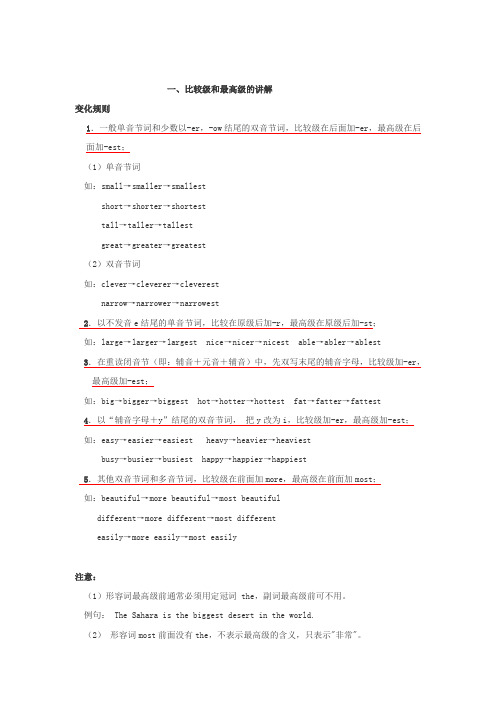
一、比较级和最高级的讲解变化规则1.一般单音节词和少数以-er,-ow结尾的双音节词,比较级在后面加-er,最高级在后面加-est;(1)单音节词如:small→smaller→smallestshort→shorter→shortesttall→taller→tallestgreat→greater→greatest(2)双音节词如:clever→cleverer→cleverestnarrow→narrower→narrowest2.以不发音e结尾的单音节词,比较在原级后加-r,最高级在原级后加-st;如:large→larger→largest nice→nicer→nicest able→abler→ablest3.在重读闭音节(即:辅音+元音+辅音)中,先双写末尾的辅音字母,比较级加-er,最高级加-est;如:big→bigger→biggest hot→hotter→hottest fat→fatter→fattest4.以“辅音字母+y”结尾的双音节词,把y改为i,比较级加-er,最高级加-est;如:easy→easier→easiest heavy→heavier→heaviestbusy→busier→busiest happy→happier→happiest5.其他双音节词和多音节词,比较级在前面加more,最高级在前面加most;如:beautiful→more beautiful→most beautifuldifferent→more different→most differenteasily→more easily→most easily注意:(1)形容词最高级前通常必须用定冠词 the,副词最高级前可不用。
例句: The Sahara is the biggest desert in the world.(2)形容词most前面没有the,不表示最高级的含义,只表示"非常"。
英语常见形容词及比较级、最高级变化一览表
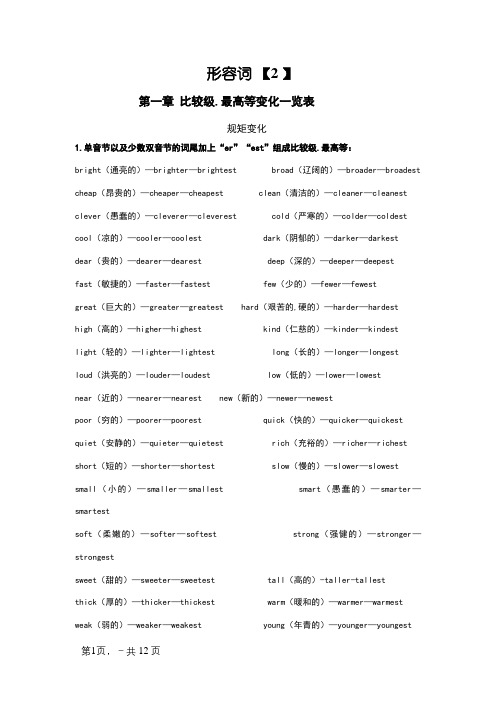
形容词【2 】第一章比较级.最高等变化一览表规矩变化1.单音节以及少数双音节的词尾加上“er”“est”组成比较级.最高等:bright(通亮的)—brighter—brightest broad(辽阔的)—broader—broadestcheap(昂贵的)—cheaper—cheapest clean(清洁的)—cleaner—cleanest clever(愚蠢的)—cleverer—cleverest cold(严寒的)—colder—coldest cool(凉的)—cooler—coolest dark(阴郁的)—darker—darkestdear(贵的)—dearer—dearest deep(深的)—deeper—deepestfast(敏捷的)—faster—fastest few(少的)—fewer—fewestgreat(巨大的)—greater—greatest hard(艰苦的,硬的)—harder—hardesthigh(高的)—higher—highest kind(仁慈的)—kinder—kindestlight(轻的)—lighter—lightest long(长的)—longer—longestloud(洪亮的)—louder—loudest low(低的)—lower—lowestnear(近的)—nearer—nearest new(新的)—newer—newestpoor(穷的)—poorer—poorest quick(快的)—quicker—quickestquiet(安静的)—quieter—quietest rich(充裕的)—richer—richestshort(短的)—shorter—shortest slow(慢的)—slower—slowestsmall(小的)—smaller—smallest smart(愚蠢的)—smarter—smartestsoft(柔嫩的)—softer—softest strong(强健的)—stronger—strongestsweet(甜的)—sweeter—sweetest tall(高的)-taller-tallest thick(厚的)—thicker—thickest warm(暖和的)—warmer—warmestweak(弱的)—weaker—weakest young(年青的)—younger—youngest2以一个元音加一个子音字母结尾的单音节词(即重读闭音节词),双写结尾的子音字母er,-estbig(大的)—bigger—biggest fat(胖的)—fatter—fattesthot(热的)—hotter—hottest red(红的)—redder—reddestsad(悲伤的)—sadder—saddest thin(瘦的)—thinner—thinnestwet(湿的)—wetter—wettest mad(疯的)—madder—maddest特殊提示:new, few, slow, clean等词含有字母组合,且发的是长元音,不用双写.3.以不发音的字母e结尾的形容词,加上“r”“st”组成比较级.最高等:able(能干的)—abler—ablest brave(大胆的)—braver—bravestclose(接近的)—closer—closest fine(好的,完善的)—finer—finestlarge(巨大的)—larger—largest late(迟的)—later—latest nice(好的)—nicer—nicest ripe(成熟的)—riper—ripestrude(粗鲁的)—ruder—rudest safe(安全的)—safer—safest strange(奇异的)—stranger—strangest wide(宽广的)—wider—widestwise(睿智的,愚蠢的)—wiser—wisest white(白的)—whiter—whitest4.“以子音字母+y”结尾的词改y为i,再加-er, -estbusy(劳碌的)—busier—busiest dirty(脏的)—dirtier—dirtiest dry(湿润的)—drier—driest early(早的)—earlier—earliesteasy(轻易的)—easier—easiest friendly(友爱的)—friendlier—friendliestfunny(好玩的)—funnier—funniest happy(高兴的)—happier—happiest healthy(健康的)—healthier—healthiest heavy(重的)—heavier—heaviest hungry(饿的)—hungrier—hungriest lazy(懒散的)—lazier—laziestlucky(荣幸的)—luckier—luckiest naughty(油滑的)—naughtier—naughtiestnoisy(嘈杂的)—noisier—noisiest pretty(俏丽的)—prettier—prettiestsilly(傻的)—sillier—silliest spicy(辣的)—spicier—spiciestthirsty(渴的)—thirstier—thirstiest ugly(丑的)—uglier—ugliest 5.双音节.多音节形容词(即音标中含有三个或三个以上元音音素的词),在单词前面加上“more”“most”组成比较级.最高等:afraid(畏惧的)—more afraid—most afraidbeautiful(俏丽的)—more beautiful—most beautifulcareful(细心的)—more careful—most carefulcheerful(高兴的)—more cheerful—most cheerfulcrowded(拥挤的)—more crowded—most crowdeddangerous(安全的)—more dangerous—most dangerousdelicious(厚味的)—more delicious—most deliciousdifficult(艰苦的)—more difficult—most difficultexciting(令人高兴的)—more exciting—most excitingexpensive(昂贵的)—more expensive—most expensivefamous(有名的)—more famous—most famousfrightened(吃惊的)—more frightened—most frightenedfrightening(令人畏惧的)—more frightening—most frighteninghard-working(勤恳的)—more hard-working—most hard-workinghelpful(有关心的)—more helpful—most helpfulhonest(说谎的)—more honest—most honestimportant(主要的)—more important—most importantinteresting(有味的)—more interesting—most interestingpolite(有礼貌的)—more polite—most politeterrible(恐怖的)—more terrible—most terribletired(累的)—more tired—most tired特殊提示:以形容前缀un组成的三音节形容词不合适上述情形,如:unhappy-unhappier-unhappiest, untidy-untidier-untidiest6. 以形容词+ly组成的副词要在前面加 more,mostSlowly-more slowly-most slowly quickly-more quickly-most quickly特殊提示:early -earlier-earliest7. 由ing分词和-ed分词演化过来的形容词(包括不规矩动词如know→known)只能加more 或most来表示它们的比较级和最高等.interesting- more interesting -most interestingexcited- more excited- most excitingtired- more tired - most tiredboring-more boring-most boring不规矩变化bad(坏的)—worse—worstfar(远的)—farther—farthest (far—further—furthest)good(好的)—better—bestill(病的)—worse—worstlittle(少的)—less—leastmany(多的)—more—mostmuch(多的)—more—mostold(年迈的)—older—oldest ( old—elder—eldest)well(好的,身材好的)—better—best特殊提示:◇further不仅可以指“距离更远”,还可指“程度更深”.记住以下三个词组:further study(进修)further education(持续教导) further information (进一步的信息)◇elder仅用于平辈之间的排行,如: elder sister(姐姐) elder brother (哥哥)◇less作为“更少”仅用来润饰不可数名词,润饰可数名词表示“更少”要用fewer.第二章形容词副词比较级较难考点◇少数单音节词前面加 more, most 组成比较级和最高等,这类形容词一般为表语形容词和由曩昔分词变成的形容词afraid -more afraid, most afraid tired - more tired , most tiredfond - more fond , most fond glad -more glad , most gladbored - more bored , most bored pleased---- more pleased , most pleased ◇下列形容词和副词的比较级和最高等有两种情势,即:既可加-er/-est也可加more/moststrict, often, friendly, clever◇下列形容词和副词没有比较级和最高(即表示“最高程度”或“绝对状况”的形容词和副词没有比较级和最高等)如:empty, wrong, perfect, unique, extreme, excellent, favourite, true, right, correct, extremely ...◇比较应在同类事物之间进行.误:Your English is better than me.正:Your English is better than mine.◇比较级前可以有一个表示程度的状语,最常见的三大润饰词是:a little, much, even. 以下单词也可用来润饰:any, far, still, a lot, yet, rather.My sister is a little taller than me.Their house is much larger than ours.别的,名词短语也可润饰比较级,解释程度.I’m three years older than he.特殊提示:very, quite, too不可润饰比较级.◇避免反复应用比较级.误:He is more kinder to small animals than I.正:He is much kinder to small animals than I.误:He is more cleverer than his brother.正:He is cleverer than his brother.◇比较要相符逻辑,在统一规模内比较时,避免将主语含在比较对象中,这时需应用other 来消除自身.误:China is larger that any country in Asia.正:China is larger than any other country in Asia.误:John studies harder than any student in his class.正:John studies harder than any other student in his class.正:John studies harder than any of the other students in his class.正:John studies harder than anyone else in his class.◇比较要遵守前后一致的原则,留意前后呼应.The population of Shanghai is larger than that of Beijing.It is easier to make a plan than to carry it out.◇序数词平日只润饰最高等.Africa is the second largest continent.The Yellow River is the second longest river in China.This is the third most popular song of Michael Jackson.◇为避免反复,我们平日用that, those, one, ones代替前面消失的名词.that代替可数名词单数和不可数名词,those代替可数名词复数.one既可指人又可指物,只能代替可数名词.The weather in China is different from that in America.The book on the table is more interesting than that(或the one)on the desk.A box made of steel is stronger than one made of wood.误:In winter, the weather of Beijing is colder than it of Shanghai.正:In winter, the weather of Beijing is colder than that of Shanghai.◇“否认词 + 比较级”相当于最高等.----Wait until we get a satisfactory reply, will you?----I couldn't agree more. The idea sounds great to me.Nothing is so easy as this. =Nothing is easier than this. =This is the easiest thing.◇比较级前一般不加冠词.但表示两者中较凸起者,且比较级后又有名词或消失了of the two,这时比较级前必定要加the.He is the taller of the two.Of the two jobs,he chose the harder.Which is the younger one, Lily or Lucy?试比较:Which is larger, Canada or Australia?Which is the larger country, Canada or Australia?She is taller than her two sisters.She is the taller of the two sisters.◇不含than 的比较级前可加不定冠词润饰,组成“a/an+比较级+单数可数名词”表示“一个更……的人/物”.Why don’t you use a sharper knife? 你为什么不用一把更锐利的刀呢?◇比较级than 后应用人称代词的主格,但非正式语体中常用宾格.He is taller than I/me.◇为避免反复,比较级中同样的动词用助动词do, does, did替代.I spend less time doing homework than John does.She tells more funny jokes than we do.以下内容不是初中教授教养的重点,仅供拓展之用.◇形容词most前面没有the,不表示最高等的寄义,只表示“异常”.It is a most important problem.=It is a very important problem.◇倍数表达法▲A is three(four, etc.)times the size(height, length etc.)of B.The new building is four times the size(the height)of the old one.这座新楼是那座旧楼的四倍大(高)/这座新楼比那座旧楼大(高)三倍.▲A is three(four, etc.)times as big(high, long, etc.)as B.Asia is four times as large as Europe. 亚洲是欧洲的四倍大/亚洲比欧洲大三倍. ▲A is three (four, etc.)times bigger(higher, longer, etc.)than B.Your school is three times bigger than ours.你们的黉舍比我们的黉舍大三倍.用times表倍数平日用于三倍以上,两倍可以用twice或double.第三章形容词副词比较级最高等重点句型归纳◇句型一:形容词或副词比较级+than…□留意事项:该句型为比较级的最根本句型.只要看到than,即可肯定前面应用比较级.He is taller than I am.The boy does his homework more carefully than the girl.◇句型二:less + 形容词的原级 + than□留意事项:该句型表示“不如.不及”,特殊须要留意的是,less本身就是little的比较级,后面必须跟形容词的原级,否认就造成了比较级的反复应用.This computer is less expensive than that one.◇句型三:as +形容词或副词的原级+ as□留意事项:该句型表示比较的两者程度相当,as之间必须跟形容词或副词的原级,决不能应用比较级.此外,还要肯定应用形容词照样副词.肯定的根据就是根据第一个as前的动词,假如是系动词(如be,感官动词look, sound, smell, taste, feel等),那么就用形容词的原级,假如前面的动词是一般的实义动词,那么就必须用副词的原级润饰动词.This lesson is as easy as that one.Lucy talks with old people as politely as her sister.特殊提示:as…as之间也可以跟名词,句型如下:☆as +形容词+ a/an +单数名词+asHe is as kind a person as his father. 他和他爸爸一样都是仁慈的人.☆as + many/much+不可数名词/可数名词复数+asI can carry as much paper as you can. 你能搬若干纸,我也能.I have as many books as you do. 我的书和你的一样多.We’ll give you as much help as we can. 我们将尽我们所能给你关心.其它几个关于as…as的句型:☆as … as one can:尽其所能He began to run as fast as he could.☆as … as possible:尽可能Please help us as quickly as possible.☆as soon as…一……就……He will call me as soon as he comes here.◇句型四:not as/so +形容词或副词的原级+ as□留意事项:该句型表示“前者不如后者……”,往往可以与句型一和句型二调换.第一个as可以换为so.This classroom is not as bright as yours.I cannot run as fast as you.◇句型五:the +形容词或副词最高等+ in / of / among +比较规模□留意事项:假如这里为副词最高等,前面的the常常省略.介词in和of的用法完整不一样.in表示“在某一规模内”,如:in the classroom,in the world.of表示“在同类之间”,of后面的词与主语同类,另名词前一般有冠词the.among表示“在(三者或三者以上)之间”,among后接代词或没有润饰语的名词.The Changjiang River is the longest river in our country.Peter is the tallest of the six students.This picture is the most beautiful among these.◇句型六:one of + 形容词最高等+可数名词复数情势□留意事项:one of有三大考点:1. 后跟形容词最高等;2. 后接可数名词复数情势;3. 作主语时主语为one,谓语动词用单数情势.One of the smallest dinosaurs was about one metre long.◇句型七:比较级+and +比较级 / more and more +多音节词的原级□留意事项:该句型表示“越来越……”,假如该形容词比较级组成情势加er,则用前面的句型;假如该形容词比较级加more组成,则用后面的句型.It is getting hotter and hotter.The girl is becoming more and more beautiful.◇句型八:the +比较级+…, the +比较级+…□留意事项:该句型意思为“越……就越……”,表示两种情形同时变化.The more you eat, the fatter you will be.In the test, the more careful you are, the fewer mistakes you will make.◇句型九:be different from□留意事项:该句型没有应用比较级,但也是对两者事物进行比较.留意前后比较需在同类事物中进行. My schoolbag is different from yours.◇句型十:the same as… / the same…as…□留意事项:该句型同样没有应用比较级,表示两者之间具有配合特征.留意这里的as和same为固定搭配,不能随意变换.I don’t want to buy the same things as Amy did.◇句型十一:比较级+than + any other +名词单数情势□留意事项:any other 后面跟单数名词,表示“任何别的”,即主语在规模内,必须把自身从这一规模内除去,不然逻辑上不通.假如主语不在这一规模内,那么要把other去失落,只用any即可. Shanghai is larger than any other city in China.(上海在中国这个规模内,所以用any other)Shanghai is larger than any city in Jiangsu. (上海不在江苏,所以只需用any)◇句型十二:比较级+than + the other +名词复数情势□留意事项:该句型相当于any other +名词单数情势,常用来进行同义句改写.该句型与句型十一固然波表面上都是比较级,但现实上相当于最高等.以下三句表达的是统一个意思.Daniel is the most hard-working student in our class.Daniel is more hard-working than any other student in our class.Daniel is more hard-working than the other students in our class.特殊提示:表示两者(人或物)比较时,比较的对象应是同类事物,不同类的事物之间无法进行比较.。
(完整)英语常见形容词及比较级、最高级变化一览表

形容词第一章比较级、最高级变化一览表规则变化1.单音节以及少数双音节的词尾加上“er”“est”构成比较级、最高级:bright(明亮的)—brighter—brightest broad(广阔的)—broader—broadestcheap(便宜的)—cheaper—cheapest clean(干净的)—cleaner—cleanest clever(聪明的)—cleverer—cleverest cold(寒冷的)—colder—coldestcool(凉的)—cooler—coolest dark(黑暗的)—darker—darkestdear(贵的)—dearer—dearest deep(深的)—deeper—deepestfast(迅速的)—faster—fastest few(少的)—fewer—fewestgreat(伟大的)—greater—greatest hard(困难的,硬的)—harder—hardesthigh(高的)—higher—highest kind(善良的)—kinder—kindestlight(轻的)—lighter—lightest long(长的)—longer—longestloud(响亮的)—louder—loudest low(低的)—lower—lowestnear(近的)—nearer—nearest new(新的)—newer—newestpoor(穷的)—poorer—poorest quick(快的)—quicker—quickestquiet(安静的)—quieter—quietest rich(富裕的)—richer—richestshort(短的)—shorter—shortest slow(慢的)—slower—slowestsmall(小的)—smaller—smallest smart(聪明的)—smarter—smartestsoft(柔软的)—softer—softest strong(强壮的)—stronger—strongestsweet(甜的)—sweeter—sweetest tall(高的)-taller - tallest thick(厚的)—thicker—thickest warm(温暖的)—warmer—warmestweak(弱的)—weaker—weakest young(年轻的)—younger—youngest2以一个元音加一个辅音字母结尾的单音节词(即重读闭音节词),双写结尾的辅音字母er,-estbig(大的)—bigger—biggest fat(胖的)—fatter—fattesthot(热的)—hotter—hottest red(红的)—redder—reddestsad(伤心的)—sadder—saddest thin(瘦的)—thinner—thinnestwet(湿的)—wetter—wettest mad(疯的)—madder—maddest特别提醒:new, few, slow, clean等词含有字母组合,且发的是长元音,不用双写。
小学英语常用形容词比较级和最高级一览表(表格形式)
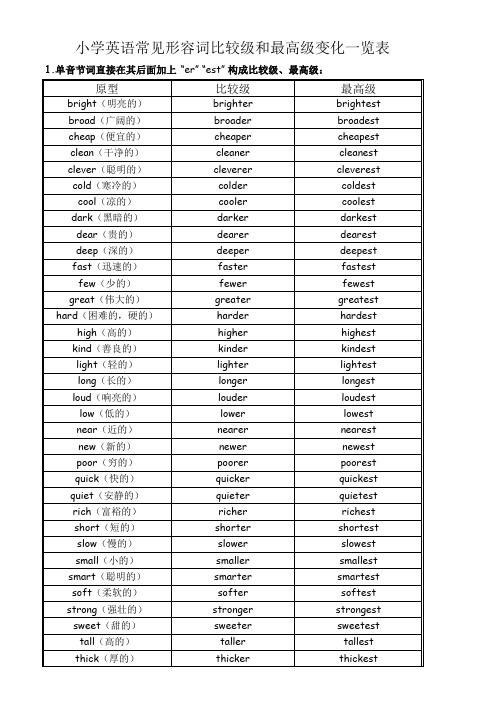
fast(迅速的)
faster
fastest
few(少的)
fewer
fewest
great(伟大的)
greater
greatest
hard(困难的,硬的)
harder
hardest
high(高的)
higher
highest
kind(善良的)
kinder
kindest
light(轻的)
lighter
lightest
silly(傻的) spicy(辣的) thirsty(渴的) ugly(丑的) 5.双音节、多音节形容词, 在单词前面加上 “more” “
原型
afraid(害怕的) beautiful(美丽的) careful(仔细的) cheerful(开心的) crowded(拥挤的) dangerous(危险的) delicious(美味的) difficult(困难的) exciting(令人兴奋的) expensive(昂贵的) famous(著名的) frightened(受惊的) frightening(令人害怕的) hard-working(勤奋的) helpful(有帮助的)
close(接近的) cute(可爱的) fine(好的,完美的) large(巨大的)
late(迟的)
closer cuter finer larger later
closest cutest finest largest latest
nice(好的) ripe(成熟的) rude(粗鲁的) safe(安全的) strange(奇怪的)
quieter
quietest
rich(富裕的)
richer
英语常见形容词及比较级最高级变化一览表

形容词第一章比较级、最高级变化一览表规则变化1.单音节以及少数双音节的词尾加上“er”“est”构成比较级、最高级:bright明亮的—brighter—brightest broad广阔的—broader—broadestcheap便宜的—cheaper—cheapest clean干净的—cleaner—cleanest clever聪明的—cleverer—cleverest cold寒冷的—colder—coldestcool凉的—cooler—coolest dark黑暗的—darker—darkestdear贵的—dearer—dearest deep深的—deeper—deepestfast迅速的—faster—fastest few少的—fewer—fewestgreat伟大的—greater—greatest hard困难的,硬的—harder—hardesthigh高的—higher—highest kind善良的—kinder—kindestlight轻的—lighter—lightest long长的—longer—longestloud响亮的—louder—loudest low低的—lower—lowestnear近的—nearer—nearest new新的—newer—newestpoor穷的—poorer—poorest quick快的—quicker—quickestquiet安静的—quieter—quietest rich富裕的—richer—richestshort短的—shorter—shortest slow慢的—slower—slowestsmall小的—smaller—smallest smart聪明的—smarter—smartestsoft柔软的—softer—softest strong强壮的—stronger—strongest sweet甜的—sweeter—sweetest tall高的-taller - tallest thick厚的—thicker—thickest warm温暖的—warmer—warmestweak弱的—weaker—weakest young年轻的—younger—youngest2以一个元音加一个辅音字母结尾的单音节词即重读闭音节词,双写结尾的辅音字母er,-estbig大的—bigger—biggest fat胖的—fatter—fattesthot热的—hotter—hottest red红的—redder—reddestsad伤心的—sadder—saddest thin瘦的—thinner—thinnestwet湿的—wetter—wettest mad疯的—madder—maddest特别提醒:new, few, slow, clean等词含有字母组合,且发的是长元音,不用双写;3.以不发音的字母e结尾的形容词,加上“r”“st”构成比较级、最高级:able能干的—abler—ablest brave勇敢的—braver—bravestclose接近的—closer—closest fine好的,完美的—finer—finestlarge巨大的—larger—largest late迟的—later—latest nice好的—nicer—nicest ripe成熟的—riper—ripestrude粗鲁的—ruder—rudest safe安全的—safer—safest strange奇怪的—stranger—strangest wide宽广的—wider—widestwise睿智的,聪明的—wiser—wisest white白的—whiter—whitest4.“以辅音字母+y”结尾的词改y为i,再加-er, -estbusy忙碌的—busier—busiest dirty脏的—dirtier—dirtiest dry干燥的—drier—driest early早的—earlier—earliesteasy容易的—easier—easiest friendly友好的—friendlier—friendliest funny好玩的—funnier—funniest happy开心的—happier—happiest healthy健康的—healthier—healthiest heavy重的—heavier—heaviest hungry饿的—hungrier—hungriest lazy懒惰的—lazier—laziestlucky幸运的—luckier—luckiest naughty调皮的—naughtier—naughtiest noisy嘈杂的—noisier—noisiest pretty美丽的—prettier—prettiestsilly傻的—sillier—silliest spicy辣的—spicier—spiciest thirsty渴的—thirstier—thirstiest ugly丑的—uglier—ugliest5.双音节、多音节形容词即音标中含有三个或三个以上元音音素的词,在单词前面加上“more”“most”构成比较级、最高级:afraid害怕的—more afraid—most afraidbeautiful美丽的—more beautiful—most beautifulcareful仔细的—more careful—most carefulcheerful开心的—more cheerful—most cheerfulcrowded拥挤的—more crowded—most crowdeddangerous危险的—more dangerous—most dangerousdelicious美味的—more delicious—most deliciousdifficult困难的—more difficult—most difficultexciting令人兴奋的—more exciting—most excitingexpensive昂贵的—more expensive—most expensivefamous着名的—more famous—most famousfrightened受惊的—more frightened—most frightenedfrightening令人害怕的—more frightening—most frighteninghard-working勤奋的—more hard-working—most hard-workinghelpful有帮助的—more helpful—most helpfulhonest诚实的—more honest—most honestimportant重要的—more important—most importantinteresting有趣的—more interesting—most interestingpolite有礼貌的—more polite—most politeterrible可怕的—more terrible—most terribletired累的—more tired—most tired特别提醒:以形容前缀un构成的三音节形容词不适合上述情况,如:unhappy-unhappier-unhappiest, untidy-untidier-untidiest6. 以形容词+ly构成的副词要在前面加 more,mostSlowly-more slowly-most slowly quickly-more quickly-most quickly特别提醒:early -earlier-earliest7. 由ing分词和-ed分词演变过来的形容词包括不规则动词如know→known只能加more或most来表示它们的比较级和最高级;interesting- more interesting -most interestingexcited- more excited- most excitingtired- more tired - mosttiredboring-more boring-most boring不规则变化bad坏的—worse—worstfar远的—farther—farthest far—further—furthestgood好的—better—bestill病的—worse—worstlittle少的—less—leastmany多的—more—mostmuch多的—more—mostold年老的—older—oldest old—elder—eldestwell好的,身体好的—better—best特别提醒:◇further不仅可以指“距离更远”,还可指“程度更深”;记住以下三个词组:further study 进修further education继续教育further information 进一步的信息◇elder仅用于同辈之间的排行,如: elder sister姐姐 elder brother 哥哥◇less作为“更少”仅用来修饰不可数名词,修饰可数名词表示“更少”要用fewer;第二章形容词副词比较级较难考点◇少数单音节词前面加 more, most 构成比较级和最高级,这类形容词一般为表语形容词和由过去分词变成的形容词afraid -more afraid, most afraid tired - more tired , most tiredfond - more fond , most fond glad -more glad , most gladbored - more bored , most bored pleased---- more pleased , most pleased ◇下列形容词和副词的比较级和最高级有两种形式,即:既可加-er/-est也可加more/most strict, often, friendly, clever◇下列形容词和副词没有比较级和最高即表示“最高程度”或“绝对状态”的形容词和副词没有比较级和最高级如:empty, wrong, perfect, unique, extreme, excellent, favourite, true, right, correct, extremely ...◇比较应在同类事物之间进行;误:Your English is better than me.正:Your English is better than mine.◇比较级前可以有一个表示程度的状语,最常见的三大修饰词是:a little, much, even; 以下单词也可用来修饰:any, far, still, a lot, yet, rather;My sister is a little taller than me.Their house is much larger than ours.另外,名词短语也可修饰比较级,说明程度;I’m three years older than he.特别提醒:very, quite, too不可修饰比较级;◇避免重复使用比较级;误:He is more kinder to small animals than I.正:He is much kinder to small animals than I.误:He is more cleverer than his brother.正:He is cleverer than his brother.◇比较要符合逻辑,在同一范围内比较时,避免将主语含在比较对象中,这时需使用other来排除自身;误:China is larger that any country in Asia.正:China is larger than any other country in Asia.误:John studies harder than any student in his class.正:John studies harder than any other student in his class.正:John studies harder than any of the other students in his class.正:John studies harder than anyone else in his class.◇比较要遵循前后一致的原则,注意前后呼应;The population of Shanghai is larger than that of Beijing.It is easier to make a plan than to carry it out.◇序数词通常只修饰最高级;Africa is the second largest continent.The Yellow River is the second longest river in China.This is the third most popular song of Michael Jackson.◇为避免重复,我们通常用that, those, one, ones代替前面出现的名词;that代替可数名词单数和不可数名词,those代替可数名词复数;one既可指人又可指物,只能代替可数名词; The weather in China is different from that in America.The book on the table is more interesting than that或the oneon the desk.A box made of steel is stronger than one made of wood.误:In winter, the weather of Beijing is colder than it of Shanghai.正:In winter, the weather of Beijing is colder than that of Shanghai.◇“否定词 + 比较级”相当于最高级;----Wait until we get a satisfactory reply, will you----I couldn't agree more. The idea sounds great to me.Nothing is so easy as this. =Nothing is easier than this. =This is the easiest thing. ◇比较级前一般不加冠词;但表示两者中较突出者,且比较级后又有名词或出现了of the two,这时比较级前一定要加the;He is the taller of the two.Of the two jobs,he chose the harder.Which is the younger one, Lily or Lucy试比较:Which is larger, Canada or AustraliaWhich is the larger country, Canada or AustraliaShe is taller than her two sisters.She is the taller of the two sisters.◇不含than 的比较级前可加不定冠词修饰,构成“a/an+比较级+单数可数名词”表示“一个更……的人/物”;Why don’t you use a sharper knife 你为什么不用一把更锋利的刀呢◇比较级than 后应用人称代词的主格,但非正式语体中常用宾格;He is taller than I/me.◇为避免重复,比较级中同样的动词用助动词do, does, did替代;I spend less time doing homework than John does.She tells more funny jokes than we do.以下内容不是初中教学的重点,仅供拓展之用;◇形容词most前面没有the,不表示最高级的含义,只表示“非常”;It is a most important problem.=It is a very important problem.◇倍数表达法▲A is threefour, etc.times the sizeheight, length etc.of B.The new building is four times the sizethe heightof the old one.这座新楼是那座旧楼的四倍大高/这座新楼比那座旧楼大高三倍;▲A is threefour, etc.times as bighigh, long, etc.as B.Asia is four times as large as Europe. 亚洲是欧洲的四倍大/亚洲比欧洲大三倍;▲A is three four, etc.times biggerhigher, longer, etc.than B.Your school is three times bigger than ours.你们的学校比我们的学校大三倍;用times 表倍数通常用于三倍以上,两倍可以用twice或double.第三章形容词副词比较级最高级重点句型归纳◇句型一:形容词或副词比较级+than…□注意事项:该句型为比较级的最基本句型;只要看到than,即可确定前面使用比较级;He is taller than I am.The boy does his homework more carefully than the girl.◇句型二:less + 形容词的原级 + than□注意事项:该句型表示“不如、不及”,特别需要注意的是,less本身就是little的比较级,后面必须跟形容词的原级,否定就造成了比较级的重复使用;This computer is less expensive than that one.◇句型三:as +形容词或副词的原级+ as□注意事项:该句型表示对比的两者程度相当,as之间必须跟形容词或副词的原级,决不能使用比较级;此外,还要确定使用形容词还是副词;确定的依据就是根据第一个as前的动词,如果是系动词如be,感官动词look, sound, smell, taste, feel等,那么就用形容词的原级,如果前面的动词是一般的实义动词,那么就必须用副词的原级修饰动词;This lesson is as easy as that one.Lucy talks with old people as politely as her sister.特别提醒:as…as之间也可以跟名词,句型如下:☆as +形容词+ a/an +单数名词+asHe is as kind a person as his father. 他和他爸爸一样都是善良的人;☆as + many/much+不可数名词/可数名词复数+asI can carry as much paper as you can. 你能搬多少纸,我也能;I have as many books as you do. 我的书和你的一样多;We’ll give you as much help as we can. 我们将尽我们所能给你帮助;其它几个关于as…as的句型:☆as … as one can:尽其所能He began to run as fast as he could.☆as … as possible:尽可能Please helpusas quickly as possible.☆as soon as…一……就……He will call me as soon as he comes here.◇句型四:not as/so +形容词或副词的原级+ as□注意事项:该句型表示“前者不如后者……”,往往可以与句型一和句型二替换;第一个as可以换为so; This classroom is not as bright as yours.I cannot run as fast as you.◇句型五:the +形容词或副词最高级+ in / of / among +比较范围□注意事项:如果这里为副词最高级,前面的the常常省略;介词in和of的用法完全不一样;in表示“在某一范围内”,如:in the classroom,in the world;of表示“在同类之间”,of后面的词与主语同类,另名词前一般有冠词the;among表示“在三者或三者以上之间”,among后接代词或没有修饰语的名词;The Changjiang River is the longest river in our country.Peter is the tallest of the six students.This picture is the most beautiful among these.◇句型六:one of + 形容词最高级+可数名词复数形式□注意事项:one of有三大考点:1. 后跟形容词最高级;2. 后接可数名词复数形式;3. 作主语时主语为one,谓语动词用单数形式;One of the smallest dinosaurs was about one metre long.◇句型七:比较级+and +比较级 / more and more +多音节词的原级□注意事项:该句型表示“越来越……”,如果该形容词比较级构成形式加er,则用前面的句型;如果该形容词比较级加more构成,则用后面的句型;It is getting hotter and hotter.The girl is becoming more and more beautiful.◇句型八:the +比较级+…, the +比较级+…□注意事项:该句型意思为“越……就越……”,表示两种情况同时变化;The more you eat, the fatter you will be.In the test, the more careful you are, the fewer mistakes you will make.◇句型九:be different from□注意事项:该句型没有运用比较级,但也是对两者事物进行比较;注意前后比较需在同类事物中进行; My schoolbag is different from yours.◇句型十:the same as… / the same…as…□注意事项:该句型同样没有运用比较级,表示两者之间具有共同特性;注意这里的as和same为固定搭配,不能随便变换;I don’t want to buy the same things as Amy did.◇句型十一:比较级+than + any other +名词单数形式□注意事项:any other 后面跟单数名词,表示“任何别的”,即主语在范围内,必须把自身从这一范围内除去,否则逻辑上不通;如果主语不在这一范围内,那么要把other去掉,只用any即可; Shanghai is larger than any other city in China.上海在中国这个范围内,所以用any otherShanghai is larger than any city in Jiangsu. 上海不在江苏,所以只需用any◇句型十二:比较级+than + the other +名词复数形式□注意事项:该句型相当于any other +名词单数形式,常用来进行同义句改写;该句型与句型十一虽然波表面上都是比较级,但实际上相当于最高级;以下三句表达的是同一个意思;Daniel is the most hard-working student in our class.Daniel is more hard-working than any other student in our class.Daniel is more hard-working than the other students in our class.特别提醒:表示两者人或物比较时,比较的对象应是同类事物,不同类的事物之间无法进行比较;。
(完整word)比较级和最高级列表

比较级和最高级列表good-better-bestnew-newer-newestbad/ill-worse-worstfar-farther-farthestfar-further-furthestmany/much-more-most little-less-leastlong-longer-longestyoung-younger-youngest old-older/elder-oldest/eldest short-shorter-shortesthigh-higher-highestdeep-deeper-deepestsmall-smaller-smallestbig-bigger-biggesttall-taller-tallestloud-louder-loudestlow-lower-lowestthin-thiner-thinestfat-fatter-fattestgreat-greater-greatest nice-nicer-nicesthappy-happier-happiestheavy-heavier-heaviestcheap-cheaper-cheapestnear-nearer-nearestclean-dleaner-cleanestfew-fewer-fewestlate-later-latestangry-angrier-angriestbusy-busier-busiestlazy-lazier-laziesthot-hotter-hottestglad-gladder-gladdestclear-clearer-cleareststrong-stronger-strongestlucky-luckier-luckiestinteresting-more interesting-most interestingdifficult-more difficult-most difficult expensive-more expensive-most expensive形容词比较级、最高级的构成一、规则变化1. 单音节词和少数双音节词(1)一般情况在原级词尾加-er构成比较级,加-est构成最高级。
(完整版)比较级和最高级列表

(完整版)比较级和最高级列表比较级和最高级列表good-better-bestnew-newer-newestbad/ill-worse—worst far—farther-farthestfar-further—furthestmany/much-more—mostlittle-less-least long—longer—longest young—younger-youngest old—older/elder-oldest/eldest short-shorter—shortest high—higher—highestdeep-deeper—deepest small—smaller-smallestbig-bigger—biggesttall-taller-tallest loud—louder-loudest low—lower—lowestthin—thiner-thinestfat-fatter-fattest great—greater—greatest nice—nicer—nicest happy—happier-happiestheavy-heavier—heaviestcheap-cheaper—cheapest near—nearer-nearestclean-dleaner-cleanest few—fewer—fewest late—later—latestangry-angrier-angriestbusy-busier-busiestlazy-lazier-laziest hot—hotter—hottest glad—gladder—gladdest clear—clearer-cleareststrong-stronger—strongest lucky—luckier-luckiest interesting-more interesting-most interestingdifficult—more difficult-most difficultexpensive-more expensive—most expensive形容词比较级、最高级的构成一、规则变化1. 单音节词和少数双音节词(1)一般情况在原级词尾加—er构成比较级,加-est构成最高级。
- 1、下载文档前请自行甄别文档内容的完整性,平台不提供额外的编辑、内容补充、找答案等附加服务。
- 2、"仅部分预览"的文档,不可在线预览部分如存在完整性等问题,可反馈申请退款(可完整预览的文档不适用该条件!)。
- 3、如文档侵犯您的权益,请联系客服反馈,我们会尽快为您处理(人工客服工作时间:9:00-18:30)。
比较级和最高级列表
good-better-best
new-newer-newest
bad/ill-worse-worst
far-farther-farthest
far-further-furthest
many/much-more-most little-less-least
long-longer-longest
young-younger-youngest old-older/elder-oldest/eldest short-shorter-shortest
high-higher-highest
deep-deeper-deepest
small-smaller-smallest
big-bigger-biggest
tall-taller-tallest
loud-louder-loudest
low-lower-lowest
thin-thiner-thinest
fat-fatter-fattest
great-greater-greatest nice-nicer-nicest
happy-happier-happiest
heavy-heavier-heaviest
cheap-cheaper-cheapest
near-nearer-nearest
clean-dleaner-cleanest
few-fewer-fewest
late-later-latest
angry-angrier-angriest
busy-busier-busiest
lazy-lazier-laziest
hot-hotter-hottest
glad-gladder-gladdest
clear-clearer-clearest
strong-stronger-strongest
lucky-luckier-luckiest
interesting-more interesting
-most interesting
difficult-more difficult-most difficult expensive-more expensive
-most expensive
形容词比较级、最高级的构成
一、规则变化
1. 单音节词和少数双音节词
(1)一般情况在原级词尾加-er构成比较级,加-est构成最高级。
如:high →higher→highest。
(2)以e结尾的词,直接加-r 或-st。
如:large→larger→largest。
(3)重读闭音节,末尾只有一个元音字母加一个辅音字母的词,先双写这一辅音字母再加-er或-est。
如:big→bigger→biggest。
(4)以“辅音字母+ y”结尾的词,先变“y”为“i”,再加-er 或-est。
如:happy→happier→happiest。
2. 大部分双音节词和所有多音节词
在原级前加more构成比较级,加most构成最高级。
如:dangerous→more dangerous→the most dangerous。
二、不规则变化
有一些词的比较级、最高级变化是不规则的,需要特殊记忆。
如:
good / well→better→best
bad / ill→worse→worst
many / much→more→most
little→less→least
far→farther→farthest(表示距离) / far→further→furthest (表示程度)
old→older / elder→oldest (表示新旧或年龄) / eldest (表示兄弟姐妹之间的长幼关系)
三、一些词的比较级和最高级,可以加-er或-est,也可以加more或most,如:clever, polite等。
四、一些词本身没有比较级和最高级形式,如:right, wrong, full, empty, round, complete, wooden, dead, daily等。
形容词比较级的用法
1. 两者比较时用形容词比较级,其结构为“... 比较级+ than ...”。
如:Actions speak louder than words.
2. 在两者之间选择“哪一个更……”时,用句型“Which / Who is +比较级, ... or ...?”。
如:Which sweater is cheaper, the red one or the yellow one?
3. 表示“两者之间最……的一个”时,用“the + 比较级”。
如:Lucy is the taller of the twins.
4. 表示“越……,越……”时,用“the + 比较级,the + 比较级”。
如:The more you eat, the fatter you will become.
5. 表示“越来越……”时,用“比较级+ and + 比较级”,多音节词和部分双音节词用“more and more + 形容词原级”。
如:We should make our country more and more beautiful.
6. 形容词比较级前可以用下列词修饰:much, a little, far, a bit, a few, a lot, even, still, rather等。
如:It's much colder today than yesterday.
形容词最高级的用法
1. 三者或三者以上的人或物进行比较时,用形容词最高级形式。
形容词最高级前通常需加定冠词the,句末常接in / of短语来表示范围。
如:He is the strongest of all the boys.
2. 表示“最……之一”时,用“one of + the + 最高级”。
如:The light bulb is one of the most helpful inventions.
3. 形容词最高级前可以由物主代词、指示代词、名词所有格等修饰,此时不用定冠词the。
如:Yesterday is her happiest day in her life
(范文素材和资料部分来自网络,供参考。
可复制、编制,期待你的好评与关注)。
